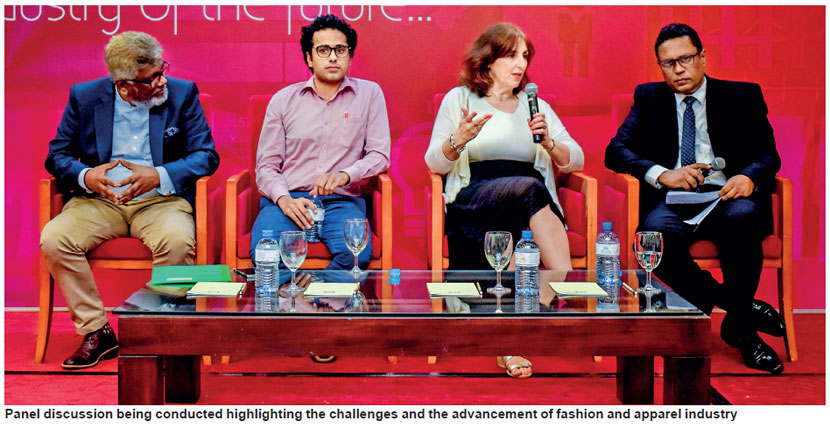Informatics Institute of Technology initiates Colombo Fashion Dialogue

Informatics Institute of Technology (IIT), the pioneer in British higher education in Sri Lanka and the country’s premier IT and Business campus recently entered the fashion sphere with the introduction of Masters in Fashion Business Management. Expanding their horizon, IIT recently initiated an exclusive event; Colombo Fashion Dialogue, which was held recently under the theme of ‘Skills for Success in the Fashion industry of the Future’ at the Lavender Hall, Bandaranayaka Memorial International Conference Hall, Colombo. The event was graced by leading figures in the fashion industry including Caroline Curtis, Senior Lecturer of University of Westminster, A.F.M Ikram, Managing Director of Emerald and Hasib Omar, Chief Executive Officer of Moose Clothing Company.
The event was further adorned by the panel discussion moderated by Saroj Lama Hewa, Director Daiwa Impex. Caroline Curtis, Senior Lecturer University of Westminster discussed about the present fashion and apparel spectrum, its future challenges and the skills required by the next generation to advance and improve the field. She further added “Designing and Management are equally important for a brand to excel in the field of fashion. Masters in Fashion Business Management at IIT is a business course, and we have designed it in order to provide the students with the technical skills, knowledge on how to manage a clothing chain, and how to get your products from the producer until it reaches the customer.

The exclusivity lies in the soft skills such as communication, understanding and team work skills that are catered through the course. To excel in the apparel field, one must work together, understand the customers, and everyone in the clothing chain. The theoretical and practical knowledge gained at the course can be harnessed to better decision making, problem solving, understanding target market, by doing research and developments by analyzing quantitative and qualitative data.” A.F.M. Ikram, Managing Director of Emerald International, discussed his experience in re-launch and startup of Emerald Shirts, and its present ventures which benefitted the crowd. He presented the growth of the venture from the beginning. He further discussed business models and scenarios seen in the local industry.
As an experienced professional in the industry, he shared his wisdom on how young students who wish to pursue a career in fashion, should compare similarities and dissimilarities of different scenarios and models to understand fashion in urban and suburban markets. He discussed about different challenges seen in the local market. Hasib Omar, Chief Executive Officer of MooseClothing Company, did an elaborative explanation on the poised growth of apparel industry of Sri Lanka, and its growth over the years as opposed to other consumer products. He further pressed on the importance of research and development covering most of the important spheres of the fashion industry, so as to produce and deliver the best possible products, with enhanced value and features at the most reasonable prices, under a minimum time period and cost.
He elaborated how environmentally sustainable, and profitable products are a possibility, with suffice research and development.He shared his high hopes for Sri Lanka to challenge international brands and create a brighter future. The event was further enlivened with the panel discussion moderated by Saroj Lama Hewa, Director Daiwa Impex. As the 3 spokes personals from diverse spheres from the same industry, sat on the panel they presented their diverse views on different heating questions and issues of the field. The fashion or the apparel industry is one of the most fast paced industries which has been going through many different evolutions across the world. Today the industry has joined hands globally to meet different ends. But as time evolves, more complex millennial challenges are placed before them to be solved.
Customers are changing, as they demand more transparent business models, and they tend to question the sourcing and sustainability of the products.But asA.F.M. Ikram discussed in the panel discussion, this changing and fading trends are what keeps the industry moving. To meet these challenges and advance forward with sustainable solutions and better choices to the market, the industry requires to invest more on research and development, adapt according to the millennial trends and acknowledge the change. For this, the industry requires skilled professionals. The definition of skilled professionals has drastically changed, and with the introduction of artificial intelligence, it is bound to go a never before witnessed revolution.
So as a leading country with poised improvement in the apparel industry, Sri Lanka needs to create a skilled generation to support and advance the Sri Lankan fashion industry to the international arena. On the other hand to reach the poised potential of the Sri Lankan context, we need to strengthen and motivate the entrepreneurship, as the new ideas and ventures are crucial to the industry. IIT’s Masters in Fashion Business Management is one step of this accoladed academy to bring Sri Lanka closer to that objective. With the partnership, expertise and knowledge of the University of Westminster, IIT is looking forward to a brighter future for the next generation of the Sri Lankan Fashion industry.
Informatics Institute of Technology (IIT) was established in 1990 as the first private higher education institute that awards reputed British degrees in the field of ICT and Business. IIT is an award-winning campus offering internal postgraduate and undergraduate degrees from the University of Westminster, UK and Robert Gordon University, UK. IIT has played a pivotal role in strengthening the IT and Business sectors in Sri Lanka over the years by producing world-class graduates. These graduates have gone on to become successful entrepreneurs and IT/Business professionals in both local and international corporate and government entities. Since its inception, IIT has produced thousands of graduates who have excelled in hundreds of organisations around the globe.

